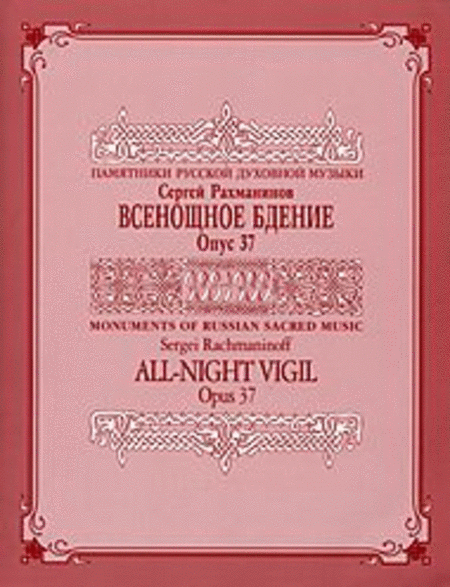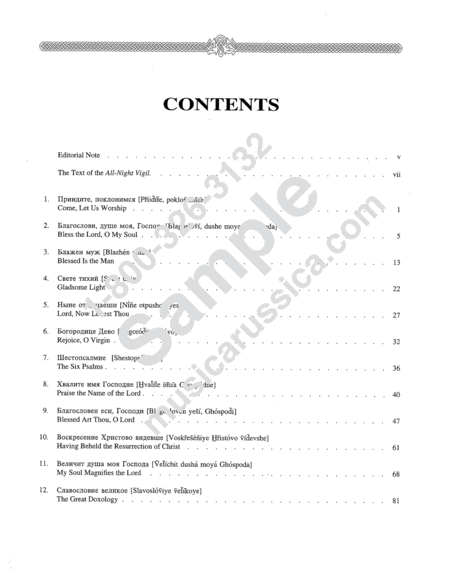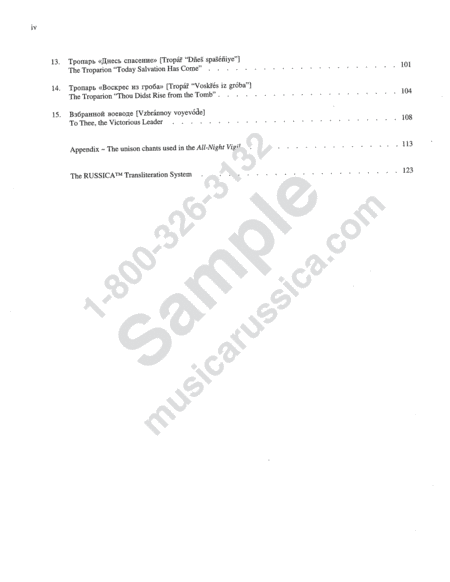All-Night Vigil ('Vespers')
Vsenoshchnoye bdeniye
-
Ships in 2 to 3 weeks
Details
Description
SKU: MR.RA-ANV
Vsenoshchnoye bdeniye. Composed by Sergei Rachmaninoff. Edited by Vladimir Morosan and Alexander Ruggieri. Sacred. With Language: Church Slavonic. Musica Russica #RA-ANV. Published by Musica Russica (MR.RA-ANV).ISBN 9780962946066.
Acknowledged as the pinnacle of the early20thcentury new Russian choral school, Rachmaninoff's Vigil has become a fixture in the worldwide choral repertoire. This edition of Rachmaninoff's masterwork is the gold standard, used by choirs all over the world for the past 20 years. The true and tested Russicao transliteration system ensures superior and authentic diction results. Audio diction tracks can be downloaded from Musica Russica's website.
Sergei Rachmaninoff's AllNight Vigil , opus 37, stands as the crowning achievement of the Golden Age; of Russian Orthodox sacred choral music. This period, which began in the 1880s and lasted until the communist takeover in 1917, was a time when dozens of Russian composers, from such prominent figures as Tchaikovsky and RimskyKorsakov to lesserknown choral specialists; such as Kastalsky, Chesnokov, Gretchaninoff, and Nikolsky, turned their creative energies to composing choral music on texts drawn from the Russian Orthodox liturgy.
Much of the melodic material was drawn from the wellspring of ancient unison chants,,known by such exotic names as Znamenny (meaning notated by means of neumes;), Kievan (referring to Kiev, the cradle; of Russian Christianity and Eastern Slavic civilization), and Greek (ostensibly stemming from Byzantium, the Second Rome). To use these chants in contemporary liturgical circumstances, however, required dressing them up, so to speak, in new polyphonic attire. Ten of the fifteen hymns are based on unison chant melodies drawn from the service as it would have been sung in medieval Russia; for the remaining five sections Rachmaninoff composed what amount to his own chant melodies.
Viewed in the broad context of twentiethcentury European music, Rachmaninoff's work is quite conservative; and, at the same time, quintessentially Russian. It is a setting of the AllNight Vigil service, a curious liturgical concatenation of three services,,Vespers, Matins, and First Hour,,which was introduced in Russia in the fourteenth century, but proved to be popular and enduring in Russia alone of all Orthodox nations. For his setting Rachmaninoff chose fifteen major psalms and hymns that form the unchanging framework of the Resurrectional Vigil (the service celebrated every Saturday evening).
The music is for chorus a cappella , the traditional vocal complement in the Russian Orthodox Church, which has maintained the ancientChristian patristic prohibition against musical instruments of any kind.
Rachmaninoff's choral masterpiece, the AllNight Vigil was written in 1915, and was premiered March 10, 1915, in a concert by the Moscow Synodal Choir under the direction of Nikolai Danilin, a friend and classmate of Rachmaninoff's.



 Share
Share